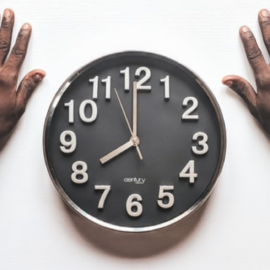

This article is an excerpt from the Shortform book guide to "No More Mr. Nice Guy" by Robert Glover. Shortform has the world's best summaries and analyses of books you should be reading.
Like this article? Sign up for a free trial here .
Why do nice guys finish last? Are so-called nice guys actually as nice as they say they are?
The phrase “nice guys finish last” is often used to describe the fact that women seemingly say they go for “nice guys” but actually go for jerks. However, Dr. Robert Glover looks at this phrase in a different way, showing that so-called “Nice Guys” are often not-so-nice at all.
Here’s another way of answering the question “why do nice guys finish last?”
Why Do Nice Guys Finish Last?
Do you pride yourself on being the nicest guy in the world? Does your fear of disapproval lead you to people-please, avoid conflict, and repress parts of yourself? If this sounds like you, you might be what Dr. Robert Glover calls a Nice Guy. So, why do nice guys finish last, according to Glover?
In the face of struggle, dissatisfied men use the tactic they know best: Be nice. However, according to Glover, “being nice” rarely yields the desired outcome, and Nice Guys’ insecurities frequently emerge as passive-aggressive or dishonest behavior. Their repetitive, ineffective approach to life leads to unsatisfying intimate relationships, bitterness, and disappointment.
Glover stresses that in their frustration with life, Nice Guys are often far from nice. Their indirect and avoidant nature results in an angry cycle of self-victimization:
Nice Guy does something to appear nice → He stews in silent resentment when things don’t go his way → Unable to contain his anger any longer, he lashes out
Overall, this cycle of repression, self-pity, and fear brings out Nice Guys’ undesirable characteristics, such as dishonesty and manipulation.
Glover emphasizes that women aren’t attracted to “jerks,” as many Nice Guys assume. Rather, they’re attracted to fully realized, confident, independent humans. He states that when Nice Guys grapple with simultaneous feelings of worthiness (“I’m so nice”) and unworthiness (“But I’m so bad”), their inner tension leads to a suppression of the self that can make them appear tense and boring. Ultimately, trying too hard to be “nice,” “right,” and “good” all the time makes for a lifeless (and thus unattractive) person.
Here are some reasons why nice guys finish last, according to Glover:
1) They Depend on External Validation
Glover repeatedly states that, operating under the belief that no one will love them as they are, Nice Guys will be just about anyone you want them to be. But their approval-seeking strategies usually leave everyone dissatisfied—themselves included. In order to gain approval and avoid disapproval, shape-shifting Nice Guys depend on external validation.
Nice Guys’ fixation with external validation is best observed in their reliance on both attachments and women’s approval.
2) They Rely on Attachments
According to Glover, attachments are the external signifiers Nice Guys use to win others’ approval (they “attach” these things to their personal value). These attachments can be something you do to your appearance or a behavior or trait you highlight, such as:
- Meticulously steaming your clothes for work every morning
- Obsessively thanking every cashier you interact with
- Being the first among your friends to own the newest iPhone
What’s wrong with putting effort into your appearance or doing something kind for a stranger? Nothing, on the surface. Glover asserts that the answer lies in one question: Who are you doing it for?
If you notice yourself doing something solely for the sake of others, Glover says you’re using it as an attachment. A Nice Guy might think a messy desk at work signifies he’s “bad.” So, he becomes obsessed with keeping it clean to assert how “good” he is. (If an Ideal Man keeps his desk at work clean, it’s because he wants to.)
3) They Rely on Women’s Approval
Glover indicates that even more so than other attachments, Nice Guys connect their self-worth to the moods, behaviors, and approval of women (be it their partner, mother, teacher, and so on). This may cause a Nice Guy to focus solely on his partner’s emotions and opinions (while ignoring his own), but Glover points out that, somewhat concerningly, Nice Guys place women on such a high pedestal (almost to a God-like degree) that they switch between treating ladies with either intense adoration or resentful fury.
If you spend time on social media, you’ve probably seen screencaps from dating and social media apps that demonstrate this behavior:
One minute, a Nice Guy politely reaches out to a woman with adoring compliments. After no response, the Nice Guy changes his tune and lashes out with slurs, insults, and negative generalizations about all women.
4) They Conceal Their Shortcomings and Mistakes
Nice Guys want to avoid disapproval as much as they want to gain approval. To stave off conflict and criticism, Glover explains that Nice Guys go out of their way to hide their true selves, including perceived flaws (like being late or sad) or everyday parts of being human (like having sexual desires).
Glover discusses a variety of (conscious and unconscious) tactics Nice Guys use to avoid their “bad” selves, but they can be distilled into one goal: Don’t address problems—fix reactions. According to Glover, Nice Guys have trouble accepting responsibility for their actions. They don’t admit fault or address their wrongdoings when they mess up. Instead, he says Nice Guys want to quickly fix the reactions to their mistakes rather than the problem at hand.
Glover takes us through some of the behaviors Nice Guys fall back on when they’re “found out” or forced to confront their mistakes. To demonstrate this response, let’s say a Nice Guy’s wife asks if he remembered to take out the trash (he didn’t). Instead of owning his mistake and saying, “Sorry, I didn’t. I’ll handle that now,” the Nice Guy might…
Justify: “I already did the laundry today, so what’s the big deal?”
Defend: “I was just about to do it. You don’t need to remind me.”
Excuse: “I’ve just been really busy and I thought we were out of trash bags.”
The Nice Guy may also try to rationalize their behavior by bringing up the other person’s mistakes and flaws, or by blaming the other person for the mistake.
5) They Are Selfishly Unselfish
According to Glover, Nice Guys’ “unselfish nature” stems not from generosity but a desire to appear unselfish. Consequently, Nice Guys live their lives for others by ignoring their own needs and tending to everyone else (while assuming incorrectly others will do the same).
This behavior, Glover explains, stems from a distorted self-concept in which they believe—and want others to believe—they’re needless, low-maintenance guys (a trait they think is inherently good).
6) They Use Covert Contracts
Glover asserts that Nice Guys’ “generosity” almost always comes with strings attached.
According to Glover, Nice Guys assume covert contracts work like this:
I do something for you → You do something for me → We both walk away satisfied, pretending our needs and this transaction never existed
A common example of a covert contract is giving a compliment just to hear one back. When you get a new haircut and no one notices, you might compliment a coworker’s hairstyle to prompt a similar compliment. In this case, your kind words didn’t come from a genuine place but from a personal need for external validation.
Many of the unproductive beliefs and dysfunctional dynamics we’ve already discussed negatively affect a Nice Guy’s ability to be intimate or take charge of his career. But Glover notes a few more behaviors standing between Nice Guys and success in these two areas:
7) They Resist the Generosity of Others
In their quest to be needless saints that must “fix” everything themselves, Glover says Nice Guys are often poor receivers. When someone tries to attend to a Nice Guy’s needs—emotional, sexual, work-related, or otherwise—they challenge his negative beliefs about his self-worth and cause inner tension.
Glover explains that to avoid these negative feelings, Nice Guys will unconsciously avoid situations where their needs are likely to be met. For example, they’ll seek out needy people, communicate in vague ways, and self-sabotage. And because they rely on covert contracts (assuming no one wants to meet their needs) they rarely ask for help.
8) They Don’t Know When to Say Goodbye
According to Glover, Nice Guys are less likely to leave dysfunctional or toxic relationships because they dread loneliness. Rather than leave and face themselves, they work endlessly to “fix” their partner. This keeps them in a state of resentment (remember the victim cycle). So when they do try to end things, Glover says it’s usually in a manipulative, dishonest, or accusatory manner.
9) They Settle for Bad Sex
According to Glover, Nice Guys will distract from their own shame and anxiety by focusing solely on their partner’s pleasure. This may sound generous, but it guarantees a one-way sexual experience in which their partner isn’t able to reciprocate. Partner-focused sex also causes Nice Guys to keep doing what “works,” which leads to repetitive sexual routines.
Glover explains that a Nice Guy may also engage his partner in half-hearted sex through manipulative or sneaky tactics. He thinks if he focuses hard enough on pleasing her, she won’t get mad at him and will enthusiastically reciprocate. But this tactic only leads to frustrating sex. Still, to many Nice Guys, bad sex is better than no sex. From, this, we can see that nice guys finish last because they settle for situations they are unhappy with and don’t make their needs clear.
10) These Qualities Are Unattractive
Ultimately, the above traits combine to form someone who is not attractive to the people around them, in a romantic sense or otherwise. Glover argues that who is insecure, manipulative, artificial, and unassertive will not be happy in himself, and therefore cannot build healthy and successful relationships with other people. As such, this is why nice guys finish last, according to Glover.

———End of Preview———
Like what you just read? Read the rest of the world's best book summary and analysis of Robert Glover's "No More Mr. Nice Guy" at Shortform .
Here's what you'll find in our full No More Mr. Nice Guy summary :
- Why being a "Nice Guy" isn't actually a good thing
- Why Nice Guys miss out on a life of self-acceptance, empowerment, and satisfaction
- How to know if you are a Nice Guy and how to become an "Ideal Man" instead






